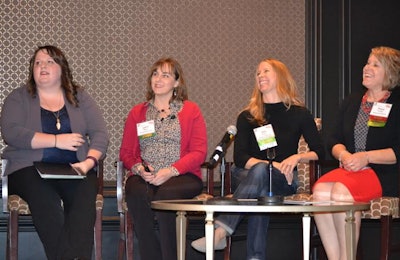
Hosting a farm tour is a good way to reach consumers who have concerns about how their food is raised.
Kansas Farm Bureau (KFB) and Kansas Soybeans have organized what they refer to as “Influencer Tours,” in which the organizations have invited bloggers to come out to farms and other agriculture-related businesses, to see these operations in person and to have their questions answered.
Meagan Cramer, KFB director of communications and marketing; Jancey Hall, Kansas soybean program manager, were joined by tour hosts and participants Stacey Forshee, grain and beef farmer; Abby Heidari, registered dietitian nutritionist; and LaVell Winsor, grain farmer, during the recent Animal Agriculture Alliance Stakeholders Summit, to discuss their experiences with the tour.

Meagan Cramer, Kansas Farm Bureau, discusses experiences with a recent 'influencer tour," where bloggers were invited to farms. | Roy Graber
Cramer said the tours were successful, and plans are in the works to organize more tours.
The five panelists at the summit provided advice for people considering influencer tours:
1. Don’t be intimidated or offended by questions
“It’s really easy to love farmers,” said Hall, adding that farmers are also easy to trust.
“If they ask you really hard questions, it means they trust you,” she said.
Winsor also advised not to be offended by questions or answer those questions in a defensive manner. Most people do not mean to be confrontational, but rather have legitimate concerns.
2. Don’t try to ‘baptize’ tour participants
People taking part in the tours will come in with preconceived notions about agricultural operations. Many viewpoints will differ, although some viewpoints will change after tourists learn the truth. “Don’t baptize them into your way of thinking,” advised Hall. Instead, try to make them understand your point of view.
3. Find ways to demonstrate your points
Forshee explained that at her family’s farm, they have a field of genetically modified (GMO) soybeans. In many people’s minds, GMO crops are not safe to eat.
But while showing tourists around the farm, Forshee cracked open a soybean pod and started to eat some beans that were inside. That made some participants nervous about Forshee’s safety, but she explained that they were in fact safe to eat. In fact, some tour participants ate some soybeans from the field themselves.
4. Feed them well
Influencer tour partipants were fed and fed well, which can play a role in improving consumer confidence about a safe and nutritious food supply provided by U.S. farmers.
“They leave full and very happy,” said Hall.
5. Create follow-up dialogue
When the tour concludes, keep the lines of communications open.
Influencer tour participants were asked to fill out a brief survey about the tour experience, but Hall said it is best to keep the survey short and not cumbersome. Closed Facebook groups can be created for those who took part in the tour.
Several of the panelists said they have stayed connected via social media with those on the tour, and a genuine interest in each other’s lives has been a result of those efforts to keep in touch.


















